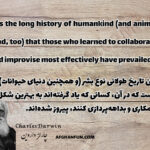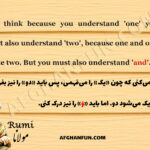Love’s Geography: Wherever You Are, Let It Bloom.
Wherever you are, and whatever you do, be in love.
Rumi
Finding Love’s Center: Wherever You Are, Reside in It.
هر کجا که هستی و هر کاری که میکنی، عاشق باش.
مولانا
این جمله زیبا از مولانا، دعوتی است به عشق ورزی در همه حال و در همه امور زندگی. مولانا معتقد است که عشق نیروی محرکه اصلی جهان است و انسان برای رسیدن به کمال و سعادت باید عاشق باشد. او با این جمله، ما را به این نکته مهم دعوت میکند که عشق را نه تنها در روابط عاطفی بلکه در همه ابعاد زندگی خود بگنجانیم. یعنی در کار، در روابط اجتماعی، در عبادت و حتی در مواجهه با طبیعت، عشق ورزیدن را فراموش نکنیم.
معنی ضمنی:
عشق به عنوان نیروی محرکه: عشق به مثابه انرژیای است که به انسان انگیزه و جهت میدهد.
عشق به عنوان راهی برای رسیدن به کمال: عشق، انسان را به سوی کمال و نزدیکی به خداوند سوق میدهد.
عشق به عنوان کلید سعادت: عشق، کلید سعادت و آرامش درونی است.
Wherever You Do: Let Love Be Your Action.
Ҳар ҷое ки ҳастӣ ва ҳар коре ки мекунӣ, ошиқ бош.
МАВЛОНО ҶАЛОЛУДДИН МУҲАММАДИ БАЛХӢ
Ин ибораи зебои Мавлоно, даъвати ба ишқварзӣ дар ҳар ҳолат ва дар ҳар коре, ки мекунем, мебошад. Мавлоно бовар дорад, ки ишқ қуввати ҳаракатдиҳандаи аслии олам аст ва инсон барои расидан ба камол ва саодат бояд ошиқ бошад. Ӯ бо ин ибора, моро ба ин нуқтаи муҳим даъват мекунад, ки ишқро на танҳо дар муносибатҳои ишқӣ, балки дар ҳама абъод зиндагии худ ҷой диҳем. Яъне дар кор, дар муносибатҳои иҷтимоӣ, дар ибодат ва ҳатто дар мувоҷеҳа бо табиат, ишқварзиро фаромӯш накунем.
Маънои ғайримустақим:
Ишқ ҳамчун қуввати ҳаракатдиҳанда: Ишқ ба мисли энержиест, ки ба инсон ангеза ва самт медиҳад.
Ишқ ҳамчун роҳе барои расидан ба камол: Ишқ, инсонро ба сӯи камол ва наздикӣ ба Худо роҳнамоӣ мекунад.
Ишқ ҳамчун калиди саодат: Ишқ, калиди саодат ва оромии даронӣ аст.
Wherever you are, and whatever you do, be in love.
أينما كنتَ، ومهما فعلتَ، كُنْ في حالةِ حبٍّ.
مولانا جلال الدین محمد الرومي
هذه العبارة الجميلة من مولانا، دعوة إلى المحبة في كل حال وفي كل عمل نقوم به. يعتقد مولانا أن الحب هو القوة الدافعة الرئيسية في الكون وأن الإنسان للوصول إلى الكمال والسعادة يجب أن يكون محباً. وبهذه العبارة، يدعونا إلى هذه النقطة المهمة وهي أن نجعل الحب ليس فقط في العلاقات العاطفية بل في جميع جوانب حياتنا. أي في العمل، وفي العلاقات الاجتماعية، وفي العبادة وحتى في مواجهة الطبيعة، لا ننسى المحبة.
المعنى الضمني:
الحب كقوة دافعة: الحب كطاقة تعطي الإنسان الدافع والاتجاه.
الحب كطريق للوصول إلى الكمال: الحب يقود الإنسان إلى الكمال والقرب من الله.
الحب كمفتاح السعادة: الحب هو مفتاح السعادة والسلام الداخلي.
This quote from Rumi, “Wherever you are, and whatever you do, be in love,” carries profound depth, encouraging a state of being that transcends mere action and invites a shift in perspective. It reflects Rumi’s mystical philosophy, emphasizing love not just as an emotion or a relationship, but as a way of being, of perceiving, and engaging with the world.
1. Unconditional Presence and Love
The phrase “Wherever you are, and whatever you do,” suggests that love is not confined to particular moments or specific people, but is an all-encompassing attitude that should pervade every circumstance of life. Rumi implies that love should not be something we reserve for special occasions, for moments of joy, or for those we cherish; rather, it should be a constant, universal presence in all that we experience. This might be love for the present moment, for the task at hand, for the people we encounter, or even for the challenges we face.
Love, in this sense, is a state of being rather than a reaction. It’s about aligning with the flow of life in such a way that every action, thought, and interaction is infused with a sense of care, connection, and reverence. It is less about what we do and more about how we do it — with intention, compassion, and presence.
2. Integration of Love and Action
Rumi is also suggesting a radical integration of love into action. To “be in love” is not simply to feel it, but to embody it in our actions and decisions. It’s about a spiritual transformation where love becomes the filter through which everything is viewed and engaged with. Whether you’re working, interacting with others, or simply existing in solitude, love becomes the lens through which your life unfolds.
In practical terms, this could mean:
- In your work: Approach it with passion, dedication, and a sense of purpose, as if the work itself is an act of love.
- In your relationships: Be present and nurturing, not just physically but emotionally and spiritually, treating others with the same care and compassion that you would want for yourself.
- In your struggles: Accept even difficulties as opportunities to learn and grow, accepting challenges with a sense of grace and love.
This idea suggests that all human actions, from the most mundane to the most profound, can be transformed if done with a deep, conscious love.
3. The Spiritual Dimension of Love
Rumi, a Sufi mystic, often uses the idea of love to point toward the divine. In his teachings, love is not just an interpersonal or emotional experience but a bridge to the sacred. By “being in love” wherever you are and whatever you do, he is suggesting that we approach life with a sense of devotion and reverence — an awareness that every moment is an opportunity to connect with the divine, to experience a deep, sacred unity with the universe.
In this interpretation, love becomes a spiritual practice. It is not just something we seek from others but a way to transcend the ego, a means to connect to the deeper currents of existence. When we are in love, in Rumi’s sense, we align ourselves with the highest truth, allowing the divine presence to express itself through our every action.
4. Transformation of the Self
By “being in love” at all times, Rumi is also pointing to the transformative power of love. Love, in his view, has the potential to shift our perspective entirely. It softens the harshness of the ego, dissolves the barriers between self and other, and opens us to a more expansive, inclusive way of being. Love allows us to transcend separateness and feel interconnected with all beings and all of existence.
This transformation is not necessarily romantic love but an all-encompassing, unconditional love. It calls us to cultivate qualities of patience, compassion, kindness, and empathy in every interaction, not because we have to, but because love naturally guides us to these qualities. It is about cultivating a heart and mind that sees the sacred in every person, every action, every moment.
5. Timelessness and Universality
Rumi’s use of “wherever you are” and “whatever you do” reinforces a sense of timelessness and universality. Love, in Rumi’s philosophy, is not bound by time or place. It’s a state of being that transcends context and circumstance. Whether you are in a moment of great joy or facing adversity, love remains the constant, unchanging thread that binds everything together.
This suggests that love isn’t just something we experience during pleasant times; it’s a way to meet the world in every circumstance. Even in suffering, love can be present, transforming the experience by turning it into an opportunity for growth, compassion, or deeper connection.
6. A Call to Higher Consciousness
Finally, Rumi’s quote could be seen as a call to higher consciousness. Love here is not a passive state, but an active invitation to engage with life on a deeper, more meaningful level. It challenges us to live with purpose, to be conscious of our interactions, and to approach every situation with mindfulness and affection.
When we embrace the idea of being in love wherever we are, we are invited to practice living consciously — not distractedly or mechanically. Love awakens us to the beauty of existence and invites us to see every moment as a gift to be cherished and honored.
Conclusion
At its core, Rumi’s quote is about the integration of love into every aspect of life, transcending the boundaries of time, place, and circumstance. It calls us to live in a way that is both spiritually attuned and practically engaged, reminding us that love is not a fleeting feeling but a transformative way of being. By embodying love in everything we do, we begin to approach life as an act of devotion, turning every moment into an opportunity to express and experience the divine.
In a world where life often feels fragmented, stressful, or disconnected, Rumi’s words offer a reminder that we can return to love — always, everywhere, and in everything we do.
External links:
This Rumi quote, found on “Goodreads“











